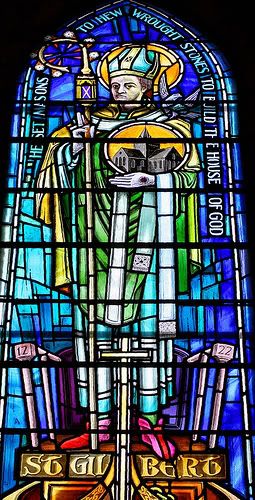Today, February 16, we celebrate the feast day of Saint Gilbert (born 1083, died 1189) of Sempringham, England, the only English founder of a religious order during the Middle Ages. Saint Gilbert’s life was quite different than what was expected of him by his parents and society. Born to a Norman knight and a Saxon peasant, he grew up in a time where the memories of the Norman invasion of England were still well preserved. He, like many of mixed heritage at the time, suffered ostracism and disdain from his peers.
Compounding his difficulties, Gilbert was apparently born with some form of disability, likely believed to be curvature of the spine. So odd was his appearance as a youth, the servants of the house even refused to eat at the same table as him. However, his mother, a woman of great faith, cared for him without hesitation, having been greeted by a vision prior to his birth, alerting her to the special gifts he would bring to the world.
Given his physical limitations, and the fact that he was not a particularly good student, Gilbert was sent to France to study, rather then join the army as was expected of the son of a knight. Surprisingly, he excelled at his studies abroad, returning to the area having earned the title of “Master,” and embarking on a mission to educate the children of the area—both male and female, which was relatively unheard of at the time. As the news of his education and piety spread, he was granted the rectories at Sempringham, which would have allowed him to live a comfortable life. Howver, he instead dedicated his life and his inheritence to serving the poor, while studying and residing with the nearby Bishop of Lincoln.
Despite his holiness and commitment to the Lord, Saint Gilbert did not take his vows and enter the priesthood until his fortieth year, citing his belief that he was unworthy of the position. Similarly, offered the archdeaconship of the largest diocese in Europe at the time, he declined, humbly preferring to stay in Sempringham.
It was there that he established a convent for women, attached to the church at Sempringham. He later established monsteries for lay sisters, ministering priests, and lay brothers. Eventually he had a chain of 26 convents, monasteries, and missions. The community would come to be known as the Gilbertine Order, approved by Pope Eugenius III, with Saint Gilbert as it’s Master. He travelled from location to location, supervising the Order, as local bishops were not permitted to oversee the community members. He established the Gilbertine Rule—a vow he himself did not take until he was near death, as he professed his belief it would be arrogant to do so, as he had written it. The rule put love of God first and foremost, but also included service to the community and the poor, humility, modesty, and acts of penance and self-denial.
The Gilbertine communities became known for their discipline, fasting and self-denial, and service to the poor. Over the years a special custom was created in the houses of the order called "the plate of the Lord Jesus." The best portions of dinner were put on a special plate and shared with the poor, reflecting Saint Gilbert's lifelong concern for less fortunate people. He himself ate little, mainly roots, and slept little—taking short rests in a chair. He would instead spend the night in prayer. At one point in his life, he suffered imprisonment on the false accusation of aiding the exiled Saint Thomas a Becket. While he had not sent aid, he refused to make an oath stating as such, as he did not want to appear uncharitable toward the exiled bishop. Rather, he endured prison until his name was cleared. Despite the harshness of his daily penance, Saint Gilbert lived a long life, past age 100. His death was marked with “bright lights, sweet odors, and incorrupt clothings.” Numerous miracles and cures have been reported at his tomb.
Saint Gilbert of Sempringham is a model of Christian love and charity in overcoming disadvantages. Born at a time where his lineage and appearance were considered unsavory, though the grace of God, he became recognized not for what was on the outside, but for his humility, service, and piety—his internal gifts from the Lord. He withstood scorn and judgment from society, much like Christ, never ceasing to serve those in need. Saint Gilbert carried with him a great humility, neither asking for nor accepting earthly praise for his good deeds. His life story inspires us to look past our perceived shortcomings, and search inside for the gracious gifts that have been bestowed on us by our Lord.
Day 47 of 365
Prayer Intentions: Humility and Charity; Those who serve others.
Requested Intentions: For a restorative, faith-deepening Lent for all those who are struggling (L); For a niece suffering with autism, and for all those affected by autism (V); For a daughter’s employment (J); For a son’s employment and growth in faith (M); Those planning for surgery (L); Those who are unemployed or in danger of losing jobs (A).
Special Intentions (Day 6 of 45-day Novena to Our Blessed Lady of Lourdes): The intentions of all those who read this blog, whether submitted or retained in the quiet of their hearts; Penance, Penance, Penance for sinners; For all those who are suffering.





No comments:
Post a Comment
Thanks for leaving a comment. If you wish to submit a prayer request, however, please do so above, using the "Contact" tab.